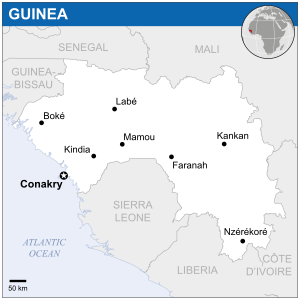Guinean presidential election, 2015
|
|
|||||||||||||||||||||||
|
|||||||||||||||||||||||
|
|||||||||||||||||||||||
|
|
|||||||||||||||||||||||
|
|||||||||||||||||||||||
Presidential elections were held in Guinea on 11 October 2015. The result was a first-round victory for incumbent President Alpha Condé, who received 58% of the vote.
In December 2013, the Ebola virus epidemic in West Africa that began in Guinea spread to neighbouring Sierra Leone and Liberia, as well as with health workers and visitors who returned to their respective countries. At the time of the elections the worst of the epidemic was over, although there were still a lesser number of prevalent cases.
The seven opposition parties called for a postponement, citing alleged irregularities in the electoral roll, but their pleas were rejected by the Independent National Electoral Commission (CENI).Cellou Dalein Diallo of the Union of Democratic Forces of Guinea (UFDG) also petitioned the Supreme Court of Guinea to have the election postponed, but it was rejected.
The elections were held using the two-round system, with a second round taking place if no candidate received more than 50% of the vote in the first round. Presidents are limited to two terms in office, allowing incumbent president Alpha Condé to run for a second term.
...
Wikipedia


